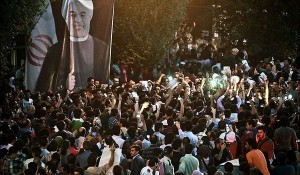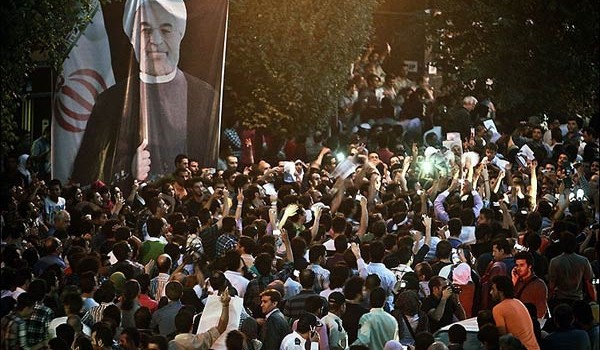 The death of Nelson Mandela last December at the age of 95 brought forth an outpouring of prepared grief and remembrances worldwide. Here in the United States, leaders and politicians of all stripes stepped forward to the cameras, eager to praise the former South African President.� One by one, they eulogized Mandela as a statesman, the father of a democratic South Africa, a historical figure whose tolerance and forgiveness for his former captors held a divided country together.
The death of Nelson Mandela last December at the age of 95 brought forth an outpouring of prepared grief and remembrances worldwide. Here in the United States, leaders and politicians of all stripes stepped forward to the cameras, eager to praise the former South African President.� One by one, they eulogized Mandela as a statesman, the father of a democratic South Africa, a historical figure whose tolerance and forgiveness for his former captors held a divided country together.But with remembering comes�forgetting�and so it is with the post-apartheid regime in South Africa. It�s hard to imagine now, but for much of the 1980s the American public and media held South Africa in ill repute as a fallen member of the international community, a nation wicked enough to supply the public imagination with villains high and low, from the implacable P.W.�Botha�to the bad�guy�in Lethal Weapon 2. A charter member of that decade�s version of the Axis of Evil, the apartheid state for years had no rival for notoriety other than Iran, the Soviet Union and perhaps Qaddafi�s Libya.�

Iran�s turn?
South Africa�s transformation and redemption during the 90s is instructive as relations between the United States and Iran improve�a thaw made possible by the surprise election of Hassan Rouhani to the presidency this past June. Rouhani and his foreign policy team, led by the indefatigable Mohammad Javad Zarif, have taken a two-track, �high/low� approach to diplomacy, one that aims to deny US policy elites the moral high ground in the international realm, terrain ceded by Iran for most of the past decade to the Americans, while simultaneously seeking out direct dialogue with the broader American public through acts of online and public diplomacy.�Planned�and�impromptu�exchanges in venues like Facebook and Twitter serve the strategic goal of improving Iran�s image abroad by helping Americans forget the Iran of Ahmadinejad and the Iran of Argo.
However, while the Rouhani Facebook and Twitter campaigns have drawn considerable media attention, attributing the improved image of Iran to online �charm offenses� confuses cause for effect. Palace tweets from Tehran are the symptoms of an Iranian public tired of being viewed as a pariah by the international community, a fact conveyed to me repeatedly in interviews carried out during a research trip to Iran this past�summer.
Elections have consequences, even in Iran, and if Rouhani and Zarif are in a position to carry out theirTwitter�campaigns, that�s because they were put there by a public anxious to see their country�s good name restored. A politics of honor and dignity informs the foreign policy of the Rouhani government, not just as a practical means for ending sanctions and warding off military intervention, but also as a domestic goal valued for its own sake.
The roots of Iran�s present rehabilitation run deeper still, to the 2009 Green Movement and the original �twitter revolution.� A summer of protest transformed ordinary Iranians into heroes, fit to be f�ted on concert stages by the likes of�U2�and Bon Jovi. Reporting out of Iran suddenly became about more than the hejab and scary�murals. Most importantly, the broadcasted images of Iranian protestors marching by the millions while demanding that their votes be counted�and being arrested, beaten, or worse for doing so�made it possible for Americans to insert their imagined selves into this narrative. Suddenly they were fellow travelers in Iran�s struggle for democracy, a struggle seemingly sponsored by made-in-the-USA technology.
No nukes, no problems
Regime change and the end of apartheid finally, fully, rehabilitated South Africa. However, there will likely be no�Rainbow Nation�ending for Iran�regime change is neither necessary nor sufficient for the country�s redemption amongst the American public.
This past November�s breakthrough in Geneva between the P5+1 and Iran�and the ongoing fascination with Rouhani as a�latter-day�Gorbachev�revealed what has been obvious for some time: the American concern with Iran is, at the end of the day, related to the security of the US and its allies in the region. The US� Iran policy commitments run no deeper than resolving the nuclear portfolio and containing Iranian aspirations to regional hegemony; these commitments are reflected in a sanctions country designed to punish Iran for its nuclear program and not its systematic violation of human rights.
The stakes were always greater with South Africa, a staunch Cold War ally that nonetheless presented a continuous security and moral dilemma for the US government from the 1950s to the late 1980s. Apartheid was an embarrassment, a vulnerability that undermined South Africa�s utility as a bulwark against the Soviets. The end of the Cold War resolved this contradiction and pushed the moral imperative of ending apartheid to the forefront of US foreign policy. Deprived of the communist bogeyman and out of excuses, the continued disenfranchisement of the majority black population in their own country simply became untenable, and not just for the white government in Johannesburg. Domestic politics and a sordid racial history of its own made anti-apartheid a cause that the United States had to see through to the end.
Yet there is no analogous moral imperative with Iran, no pressing bottom line needed to secure democracy or to resolve Iran�s human rights portfolio. The strategic focus on security thus presents an opportunity and a trap for the United States, a situation that more savvy�observers�of the Iranian scene have already recognized. Under these circumstances, achieving d�tente will require a relatively straight forward exchange of assurances and guarantees: Iran will limit its nuclear program and scale back its sponsorship of proxy groups hostile to the United States and Israel, and in return the United States will lift sanctions and provide guarantees that it does not seek regime change in Iran.
However, a resolution of the nuclear standoff and the removal of sanctions will likely undo the electoral coalition that brought Iran to the negotiating table in the first place, a disparate group of reformists, ordinary Iranians scandalized by the 2009 election, and traditional conservatives determined to preserve the Islamic regime, all held together by an agenda of national reconciliation and an aversion to war, civil or otherwise. Whereas the ANC coalition in South Africa was forged during the transition from apartheid to democracy, Rouhani�s government emerged as an alternative to regime change.
Realpolitik renders this alliance fragile, a marriage of convenience perhaps fated for divorce. For many Rouhani supporters, resolving the nuclear issue is a first step, a foundation upon which to build a fuller, more inclusive democracy. Hardline elements within the regime are more likely to see any security deal with Europe and the United States as a ceiling, the price of preserving the regime and the revolution. For these stalwarts, Iran�s democratic system needs no reform as it is already without�rival�in the world.
A final deal with the United States and Europe will undoubtedly expose these contradictions.� With the survival of their regime secured abroad, hardliners in the Iranian leadership may be tempted to turn away from conciliating their publics at home. Disillusioned voters may in turn abandon the political process now underway in Iran, leaving Rouhani exposed in the middle, his position as a centrist rendered a liability.
The endgame of the nuclear standoff between Iran and the United States will ultimately resemble post-Cold War US-Russia relations. More than 30 years after�South Africa�gave up its domestic nuclear program as a cost for being reintegrated into the world community, America will have to reconcile itself to an Iran that exists as a regional power with limited if not latent access to nuclear technology.
The satisfaction of a cold peace will have to do. Power politics and the persistent violations of human rights will prevent a full reconciliation between the two countries, though these will not be significant enough to override the shared benefits of d�tente. The status of US-Iran relations is likely to settle somewhere between the turban and the crown, to borrow from Said Arjomand�between the animosity of the first three decades of the Islamic Republic and the close partnership of the Pahlavi regime during its final three decades of rule.
That is, assuming that Americans are still paying attention. Nearly a quarter of a century after the release of Nelson Mandela from prison, and less than 20 years since his election to the presidency, South Africa occupies little of the space that it once did in the public imagination of Americans.
Such is the fate of �rogue� states, current and former. Reputation and diplomacy will prove to be a mug�s game, subject to the fickle and distracted attention of an American public forever on the search for new demons and dragons to slay. In the end, Iran too will likely fade from view, relegated to the back pages of The New York Times alongside the latest, unnoticed outrage from some country in a lost corner of the world.
This Article was written�Shervin�Malekzadeh on January 27, 2013.��Shervin�Malekzadeh�is currently an Assistant Professor at Swarthmore College. His research focuses on the politics of schooling, identity, and culture in postrevolutionary Iran. A regular visitor to Iran and a witness to the 2009 Green Movement, his articles have appeared in The New York Times, The Atlantic, Time, Al Jazeera, Tehran Bureau, and Salon.
The Iran Project is not responsible for the content of quoted articles.











